
An expert from an Austrian think-tank researching and studying economic and socio-political trends has predicted that European gas prices—despite already having skyrocketed across the continent following the onset of the Russo-Ukrainian war—may double or even triple by next year.
Marcell Göttert, a researcher and energy expert at the independent, Vienna-based research institute Agenda Austria, has surmised that although gas prices for the average European consumer have already increased by around 60%, the upward trend is unlikely to abate until 2024 at the earliest. In the meantime, countries like Austria and Germany—both of whom are heavily dependent on Russian energy exports—could see costs double or triple by the year’s end, Kronen Zeitung reports.
Göttert’s statements come a few months after Kristen Westphal—a German expert who’s worked extensively on Russian foreign and energy policy as well as the EU’s external relations and international energy policy—warned that gas cuts to Germany could exact severe consequences for Germany and other EU countries, which very well could result in a cascading effect that would “lead to the collapse of entire markets.”
“If Russian gas supplies really stop flowing, it’s possible that we enter a situation where markets simply stop functioning,” Westphal said, adding: “I’m not sure that this scenario has fully dawned on companies or consumers. It’s not simply a question of comfort, but affects the basic functioning of our economy and the energy system.”
Although Russian gas supplies haven’t stopped flowing to Europe entirely, they have been reduced significantly in recent weeks. In fact, last week, after Russian state-owned Gazprom reduced its outflow via the Nord Stream I pipeline down to 40%, the German government announced that it would be moving to the second level of its emergency gas plan to help fill gas storage facilities before winter.
“The onset of summer and the seemingly ongoing gas deliveries may lure Germans into a false sense of security, but it should be noted that the situation is serious; winter will not be postponed this year, so you need to save as much gas as possible for the heating season,” Robert Habeck, Germany’s economics and climate action minister announced.
“We are in a gas crisis. Gas is now a scarce commodity. The prices are already high and we have to be prepared for further increases. We must not delude ourselves, cutting gas supplies is an economic attack on us by Putin,” he continued, adding: “It is clearly Putin’s strategy to create insecurity, drive up prices and divide us as a society.”
Other ministers have issued stark warnings to the German public as well. Last week, during an appearance on the state-funded television broadcaster Zweites Deutsches Fernsehen’s political talk show “Heute Journal,” Finance Minister Christian Lindner (FDP) warned Germans of an impending, severe economic downturn, as The European Conservative previously reported.
“There is a risk of an economic crisis that has to be taken very seriously due to the sharp increase in energy prices, due to supply chain problems, and also due to inflation,” Lindner said.
Increasingly, in addition to leading politicians and intellectuals, top figures in German industry have been warning of the dire consequences that Germany—and by extension, many countries within European Union—will soon face as a result of this new economic war.
While speaking with Frankfurter Allgemeine Zeitung days ago, Ingbert Liebing, the managing director of the Association of Municipal Companies (VKU), warned that the coming radical energy price hikes will spur a major wave of bankruptcies among German enterprises.
“If there is no more gas coming from Russia for a short time, we will have a real problem in winter. It will be worse than the COVID-19 pandemic,” said Liebing, adding that the situation could threaten Germany’s “existence.”
In the event that Germany’s gas supply from Russia is cut off completely, as many as 5.6 million jobs across the country could be lost, according to an assessment from the Bavarian Business Association (VBW).
